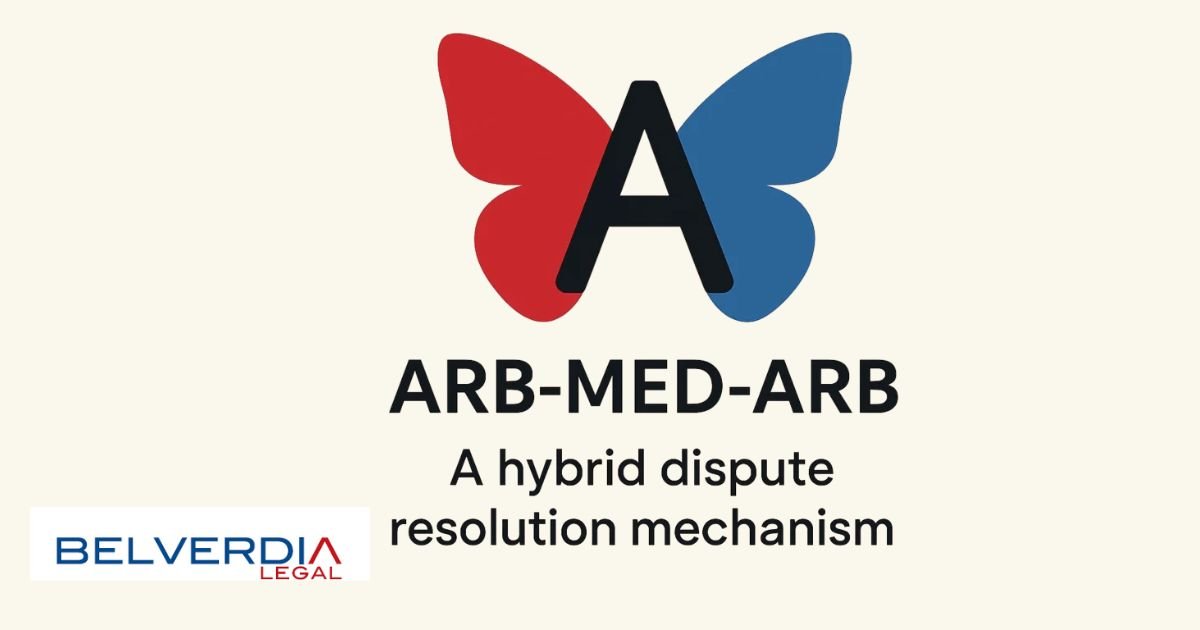Introduction
In the evolving landscape of Alternative Dispute Resolution (ADR), the Arbitration-Mediation-Arbitration (Arb-Med-Arb) process has emerged as a structured, efficient, and enforceable mechanism. This hybrid approach, pioneered by the Singapore International Arbitration Centre (SIAC) and the Singapore International Mediation Centre (SIMC), combines the strengths of arbitration and mediation to facilitate amicable settlements while ensuring legal enforceability. The Parties to the Contract, incorporating this Clause in their Agreement are benefited out of this Hybrid Method of Arbitration- which saves their Time, Money & the Business Relationship!
Understanding Arb-Med-Arb:-
1. The Three-Tiered Process-
The Arb-Med-Arb process follows a three-tiered structure:
a. Arbitration Begins – The dispute is referred to arbitration under SIAC Rules.
b. Mediation Phase – The arbitration is paused, and the parties attempt mediation under SIMC.
c. Arbitration Resumes (if needed) – If mediation succeeds, the settlement is recorded as a consent award. If mediation fails, arbitration continues.
2. SIAC & SIMC’s Role
SIAC administers the arbitration proceedings, ensuring compliance with international arbitration standards.
SIMC facilitates mediation, providing access to expert mediators who help parties reach a mutually agreeable resolution.
The consent award issued after successful mediation is enforceable under the New York Convention, making it binding in over 160 countries.
Advantages of Arb-Med-Arb
1. Cost & Time Efficiency
Mediation allows parties to settle disputes faster, reducing arbitration costs.
If mediation fails, arbitration resumes without restarting the process.
2. Confidentiality & Neutrality
Both arbitration and mediation proceedings are confidential.
Parties can choose a neutral venue for dispute resolution.
3. Enforceability of Settlement
If mediation succeeds, the settlement is recorded as a consent award.
Consent awards are enforceable like *arbitral awards* under the New York Convention.
4. Preserving Business Relationships
Mediation fosters collaborative negotiation, helping parties maintain commercial relationships.
Arbitration ensures a binding resolution if mediation fails.
5. Multi-Jurisdictional Enforcement
Arb-Med-Arb awards are recognized internationally, ensuring enforceability across multiple jurisdictions.
Industries benefiting from Arb-Med-Arb:-
1. International Trade & Commerce
Businesses engaged in cross-border transactions use Arb-Med-Arb to resolve disputes swiftly while maintaining commercial relationships.
2. Construction & Infrastructure
Large-scale projects often involve complex contracts and multi-party disputes.
Arb-Med-Arb ensures timely resolution without disrupting ongoing projects.
3. Banking & Finance
Financial institutions use Arb-Med-Arb for loan agreements, investment disputes, and regulatory conflicts.
4. Technology & Intellectual Property
Tech companies use Arb-Med-Arb for patent disputes, licensing agreements, and trade secrets.
5. Shipping & Maritime
Maritime disputes involve international contracts, cargo claims, and vessel operations.
Conclusion:-
The Arb-Med-Arb process under SIAC & SIMC offers a structured, efficient, and enforceable approach to dispute resolution. By combining mediation and arbitration, parties can achieve amicable settlements while ensuring legal enforceability, making it an ideal mechanism for international business and trade.
Prepared by:
Sr.Partner,
Belverdia Legal LLP.

